In America’s polarized politics, pointing to the errors made on both sides of the conflicts that divide us gets a bad rap. What has the Civil Rights Movement taught us? What did it say about police brutality? It just comes to show how little our society has actually come. This is understandable; oftentimes one side is clearly more at fault than the other. But when it comes to the wrenching events of this past weekend, this is not the case.
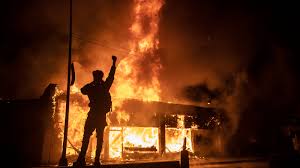
Police brutality is defined as excessive, violent force undue against a particular subject. Police brutality does not mean the right of citizens to vandalize & destroy their own communities. These riots have gotten out of hand, and by no means does it justify looting for personal benefit. By no means does it help achieve social justice, but it never started out this way.
How Did It All Start?
When Minneapolis police officer Derek Chauvin was caught on video kneeling on the neck of George Floyd for several minutes as he gasped for air and pleaded for mercy, apportioning blame seemed easy. Nearly every person in our public life, from left to right, expressed outrage at the apparent injustice — including prosecutors in Minneapolis, who charged Chauvin with third-degree murder. Protests against Floyd’s wrongful death and the long, bloody history of police brutality against African Americans were called for and would have been cheered on by just about everyone.
Then came the accelerants that turned a focused flame of justified outrage into the raging inferno that’s currently consuming cities across the country: an angry, militant faction of the far left along with freelance troublemakers out to break things for the sheer thrill of it; a population tired of feeling cooped up after more than two months of quarantine swelling the numbers on the streets; people put out of work by public-health measures hoping to grab a handful of goods in the looting; three-and-a-half years of race-baiting and partisan provocation by the president; and Democratic politicians hesitant to speak out against the destruction when it began to unfold in Minnesota and spread to other states late last week. Again this is all because of “police brutality.” From the facts, it’s out of personal greed.
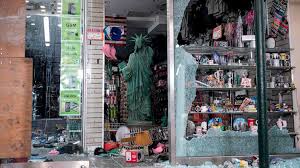
The result is a disaster that will only become worse if the mayhem doesn’t come swiftly to a halt. That’s because what began as a broad-based protest calling for justice has now become a dispute over two competing notions of justice, each of which is essential to the functioning of a free society.
Hobbesian Principle
There are two equally valid fundamental principles that undergird government, each of which is a response to one kind of fear. Let’s call them a Hobbesian principle and a Lockean principle, after the two philosophers (Thomas Hobbes and John Locke) who first elaborated them.
Hobbes claimed that politics is founded to protect each individual from having to live in a constant state of fear of dying a violent death at the hands of another individual (or group of individuals). In order to eliminate this fear of violent death, the individuals band together to empower an absolute ruler to keep the peace.
But this solution to the problem of anarchic violence creates a new problem and fear — the problem and fear of tyranny. That’s what Locke addressed in his writings, which provided arguments for the creation of a government of limited powers that would protect a list of individual rights — not just Hobbes’ right to life, but also rights to liberty, property, and (in the Jeffersonian version of Lockean liberalism) the pursuit of happiness and the other rights elaborated in the first 10 amendments to the U.S. Constitution.
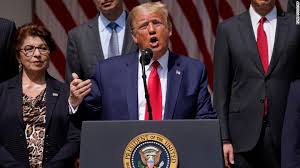
The Role of the Government
Fear of private individuals and groups, and fear of tyrannical government — those are the two principles any free society must balance. Move too far in the direction of chaos and violence on the part of individuals and groups, and there will arise a justified call for law and order to keep the peace. Move too far in the direction of law and order to keep the peace and there will arise a justified call to restrain government power in order to protect individual rights. Each society will draw these lines in somewhat different places and the lines will shift over time. But a special problem arises when the lines are drawn in different places within the same society due to systemic discrimination on the basis of race, class, and other distinctions.
The reason why the viral video of George Floyd’s final minutes of life provoked such an outrage is that it so vividly demonstrated that when it comes to the treatment of African Americans by armed agents of the state, the line is drawn too far in a Hobbesian direction. African Americans are too often treated as a threat to public peace and subjected to unjustified state violence as a result. The proper response to this demonstration of injustice is to demand that the line be redrawn for African Americans in a Lockean direction — so that our society and the agents of the state we empower to secure law and order will a better job of protecting their rights.
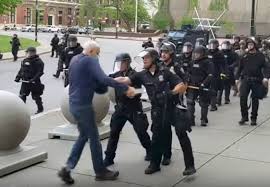
But what we’ve seen over the last week is instead an escalation of protest into vandalism, looting, violence, and outright lawlessness. That goes far past Locke into outright anarchy that resembles Hobbes’ war of each against all — which means it’s quite likely to provoke a Hobbesian response. This is already happening on the streets, as police officers facing acute threat overreact, lashing out in ways that further violate rights and provoke yet more violent protest. President Trump’s calls for “law and order” portend more dramatic Hobbesian moves.
This should surprise no one. The Hobbesian principle doesn’t only come first because Hobbes wrote his great books several decades before Locke wrote his, with the latter tacitly responding to and modulating his predecessor. Hobbes is also first in the sense that the fear of violent death is more primary or fundamental than Locke’s fear of tyrannical government.
The Implications of Police Brutality
To fear tyranny and then seek to bring it to heel, curtailing government power so it comes into conformity with the requirements of individual rights, a political order must already exist, keeping some semblance of order. But Hobbesian fear is a fear of life outside of politics altogether. It’s a fear of life in a vacuum lacking any order at all — a fear of life as it’s been lived the last few days and nights on the streets of American cities, as throngs of rioters smash windows and burn cars and businesses, storefronts, court houses, and police stations, often with no authority capable of restoring peace.
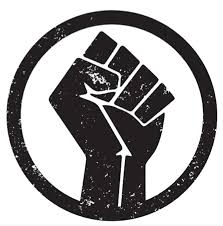
First comes order, then comes fairness. Activists may not like it, but there’s no way around this sequence of priorities. A society that has fallen prey to anarchy must restore order before it can set about trying to assure that the order is applied fairly to every individual and group that lives within its bounds.
That’s why it’s so important that things settle down, and settle down quickly. The worse the riots become and the longer they drag on, the further we will drift from a situation in which we can begin to address the injustices that sparked the unrest in the first place.

Interesting writing- but I personally do not think this is a fair take at all. You captioned the image of an elderly man who simply was walking in the direction of the police and then shoved down so that his skull is still cracked “Police have been on edge”- does that not reveal a larger problem within police culture itself? And how that town’s entire police force resigned IN SUPPORT of the police officer that pushed him? That’s not simply paranoia. I think this article could have taken a much more nuanced approach by not simplifying all protesters as a monolithic group and also examining what protects the police (unions, qualified immunity, etc.). There are peaceful protesters, there are looters who take advantage of the protests, and everything in between. There are numerous videos of local activists yelling at rioters from out-of-town to stop breaking windows. There’s not 1 singular activist motive.
“the longer they drag on, the further we will drift from a situation in which we can begin to address the injustices that sparked the unrest in the first place.” Is Congress destroyed? No. Governance can still take place. Instead, Congresspeople who join peaceful protests are being arrested by the police. Governors are going against the requests of their citizens. Through the riots, there have been laws passed to end no-knock warrants, reopen police brutality investigations, and raise the degree against Chauvin. This shows protests work. Historically we know this through Stonewall, etc- protesting in a manner that pleases the oppressor never works, because that’s not what a protest is meant to do.
“First comes order, then comes fairness.” If what you consider order is the US pre-protests, that makes no sense. If there was order then, why was it not fair? Fairness & justice will not arrive until people change the system.